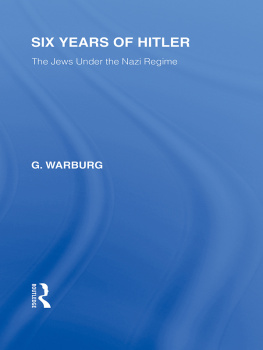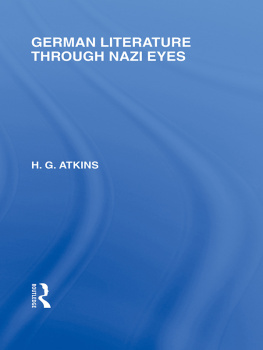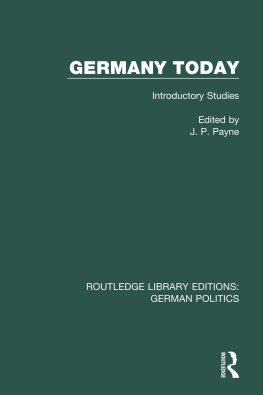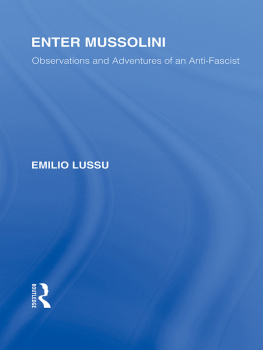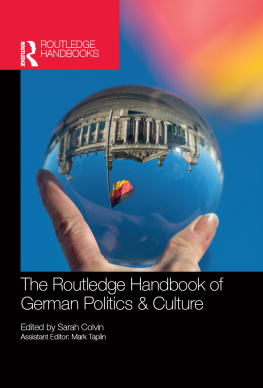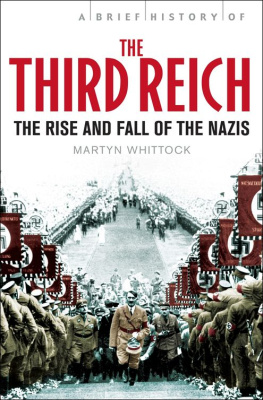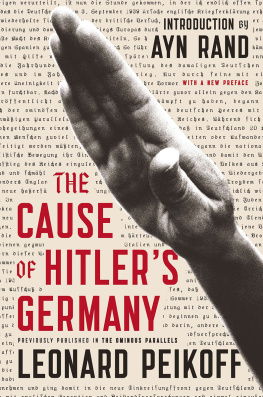ROUTLEDGE LIBRARY EDITIONS: RESPONDING TO FASCISM
I SPEAK OF GERMANY
I SPEAK OF GERMANY
A Plea for Anglo-German Friendship
NORMAN HILLSON
Volume 5

LONDON AND NEW YORK
First published in English 1937
This edition first published in 2010
by Routledge
2 Park Square, Milton Park, Abingdon, Oxon, OX14 4RN
Simultaneously published in the USA and Canada
by Routledge
270 Madison Avenue, New York, NY 10016
Routledge is an imprint of the Taylor & Francis Group, an informa business
This edition published in the Taylor & Francis e-Library, 2010.
To purchase your own copy of this or any of Taylor & Francis or Routledges collection of thousands of eBooks please go to www.eBookstore.tandf.co.uk.
1937 George Routledge & Sons, Ltd.
All rights reserved. No part of this book may be reprinted or reproduced or
utilised in any form or by any electronic, mechanical, or other means, now
known or hereafter invented, including photocopying and recording, or in any
information storage or retrieval system, without permission in writing from the
publishers.
British Library Cataloguing in Publication Data
A catalogue record for this book is available from the British Library
ISBN 0-203-85020-3 Master e-book ISBN
ISBN 10: 0-415-57699-7 (Set)
eISBN 10: 0-203-85012-2 (Set)
ISBN 10: 0-415-57947-3 (Volume 5)
eISBN 10: 0-203-85020-3 (Volume 5)
ISBN 13: 978-0-415-57699-4 (Set)
eISBN 13: 978-0-203-85012-1 (Set)
ISBN 13: 978-0-415-57947-6 (Volume 5)
eISBN 13: 978-0-203-85020-6 (Volume 5)
Publishers Note
The publisher has gone to great lengths to ensure the quality of this reprint but
points out that some imperfections in the original copies may be apparent.
Disclaimer
The publisher has made every effort to trace copyright holders and would
welcome correspondence from those they have been unable to trace.
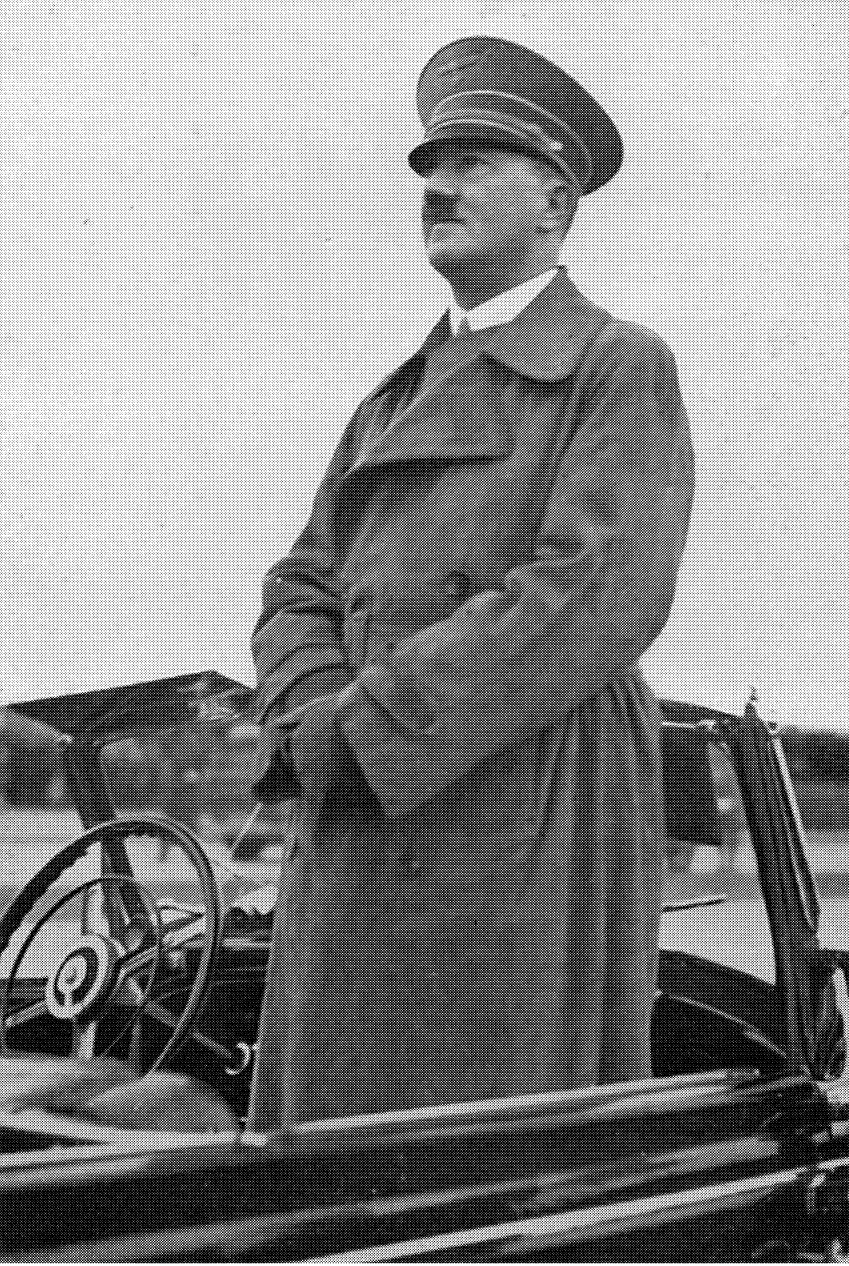
PLATE I ADOLF HITLER
NORMAN HILLSON
I SPEAK OF GERMANY
A PLEA FOR ANGLO-GERMAN FRIENDSHIP
LONDON
GEORGE ROUTLEDGE & SONS, LTD.
BROADWAY HOUSE 6874 CARTER LANE, E.C.
1937
Printed in Great Britain by Butler & Tanner Ltd., Frome and London
TO
ALAN BLAND
More matter for a May morning
LIST OF ILLUSTRATIONS
PLATES FACING PAGE |
| ADOLF HITLER |
| BUILDING A CROSSING BRIDGE ON THE BERLIN-STETTIN MOTOR ROAD |
| YOUTH AT WORK |
| BOYS FROM LABOUR CAMP AT DEUTSCHES-HAMMER MAKING AN IRRIGATION CHANNEL |
| HAMBURG-BERLIN FLYING TRAIN PASSING THROUGH THE HISTORIC SACHSEN FOREST AT 160 KILOMETRES PER HOUR |
| LABOUR CAMP AT TRACHENBURG, NEAR BRESLAU |
| 1937 VERSION OF GERMAN ROAD AND MOTOR COACH |
| ON THE ROAD TO HEIDELBERG |
I SPEAK OF GERMANY
CHAPTER I
FACE OF BERLIN
LESS than twenty years after the greatest war in history Europe is getting ready for a bigger and better war. This is no cynicism: it is statement of fact. The problem of world unemployment is being solved largely in war munition factories. There is scarcely a steelworks or naval dockyard or aeroplane factory on the Continent which is not working at full pressure. And this is true largely of Great Britain. The race for rearmament is already making fun of accepted principles of political economics. On all sides politicians are searching for new shibboleths which they hope will be heaven-sent formul. In the blind fatuity of their own past shortcomings and incompetence, they are declaring that the only way to avoid another war is to be prepared to fight in that same war. For them history has no lessons to teach and the next generation, or even that which is now growing to manhood, may have to pay a bitter bloody price for the follies of their rulers. In the varying names of democracy, autocracy and oligarchy the world is gradually drifting to a similar bankruptcy of statesmanship that precipitated the catastrophe of 1914. It is as if the world has learned nothing and forgotten everything.
In the changing face of Europe one vitally important I feature emergesthe new Germany. A short time ago a former British Foreign Minister, Sir Austen Chamberlain, who once gratuitously declared that he loved France like a mistress, recorded on paper that certain important members of the National Socialist Government in Berlin looked on Great Britain as Public Enemy Number One. It was a mischievous statement in the light of the public declarations of Herr von Ribbentrop, the newly appointed German ambassador to London. Von Ribbentrop announced that his mission was one of understanding between the German and British peoplesan understanding devoutly to be wished for and one which, I sincerely believe, is desired by the ordinary citizen (may be not the politician in all cases) in both Germany and Great Britain. If, in Germany, certain ministers in reviewing the general situation referred to the fact that the Reich had 70,000,000 people and no overseas dominions to which to export the surplus population it could not possibly maintain at home, this was hardly the occasion for Sir Austen Chamberlain to talk of hostility and forget how much the world has changed in outlook, ideals and possibilities in the last two decades. Such a statement was indicative of the Versailles mentality that mentality which is once more transforming Europe into an armed camp.
In certain quarters of England there are those who view every move or accomplishment in the Third Reich with something like suspicion. To-day the old diehard fight-to-a-finish section who persist in calling an honourable enemy Huns are reinforced by the former Pacifist and milk-and-water element who saw nothing but good in Germany when she was threatened by Communist revolution and now find a well-governed Germany the invention of the devil. Unhappily both extremes of opinion are so voluble that one is apt to lose sight of the fact that a great revolution has been accomplished in Germany and that the German people are anxious to set their house in order, and obtain from life something which stress of circumstances denied them for fifteen years after the armisticea sense of self-respect, some measure of security, a feeling of national pride. When Hitler threw over the military clauses of the Treaty of Versailles, invaded the demilitarised zone and re-introduced conscription his acts were regarded as just reversions to the pre-war German military mentality. It was conveniently forgotten that internal anarchy had rapidly reduced Germany to something like chaos and that she was surrounded by powerful states which, armed to the teeth, persistently refused to disarm. Such a situation was, in any case, intolerable to a nation which had for four years fought three-quarters of the world to a standstill and well-nigh prevailed on more than one occasion. The fact remainedand in some quarters still remainsthat Germany had once more shown signs of aggressiveness. Her new policy was plainly military. Conscription was the forerunner of war. France, which had never abandoned conscription, had built the Maginot line, and wrecked the disarmament conference, was loud in her complaints. Stalin, fresh from a review of tens of thousands of troops in Red Square, sent Maxime Litvinoff to Geneva to register protest against this latest Nazi crime against mankind. It appeared plainly a crime for Germany to assert that she was after all a great power entitled to means of self-defence. What was a delinquency in the case of the Reich was an honourable virtue in everyone else.
Next page


